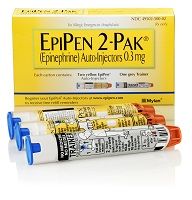
One of the questions in that letter was how much of Mylan’s revenue was a function of patients on federally subsidized health care programs. Medicare has long been an unwitting source of funding for everything from pharmaceutical companies to dishonest doctors either overbilling the program or billing for services never rendered.
The question was asked quietly, but the intent was obvious: federal lawmakers suspected that Mylan may have been plundering Medicare’s coffers, just like so many other companies before it.
Those suspicions seem to have been confirmed last week when Mylan agreed to pay $465 million to the Justice Department and other agencies to settle questions about the way it was paying EpiPen rebates to the Medicaid program.
At issue is the way Mylan was classifying the EpiPen autoinjector. The company classified the EpiPen as a generic device even though, at the time, no generic EpiPen existed. Mylan has recently taken the unusual step of announcing a generic version of their own product in response to public outcry over EpiPen pricing, however that product did not exist during the time period in question.
By classifying the EpiPen as a generic, the company was underpaying rebates by at least 10.1%, as well as failing to pay extra rebates after each price increase. Generics are subject to a 13% rebate to Medicaid with no responsibility for price increases, while brand names bring a 23.1% rebate plus additional funds for each price increase.
The state of Minnesota did the math and determined that Mylan’s actions had cost it $4.3 million – just in 2015. Factor in another six years of deception across every state in the country (including those with populations far greater than Minnesota) and the scale of Mylan’s deception increases dramatically.
It’s worth noting that, in paying the settlement, Mylan has accepted no guilt or responsibility for its actions. The company has admitted absolutely no wrongdoing, failing even to try to classify its actions as an “oversight” or a mistake. In fact, it had been warned against such behavior in the past. In the end, Mylan seemingly paid close to half a billion dollars simply to try to insulate itself from any further claims from either state or federal government agencies.
As of this writing, however, the price of two EpiPen autoinjectors remains above $600.
